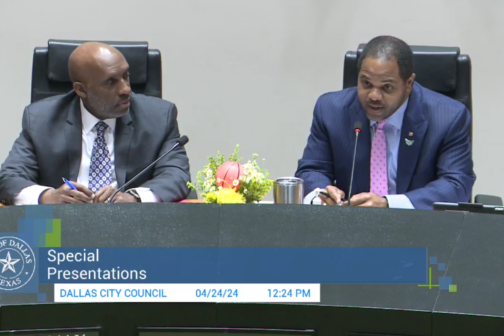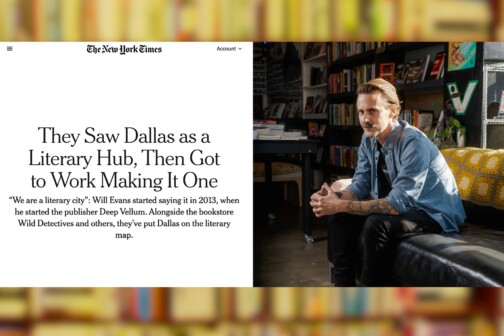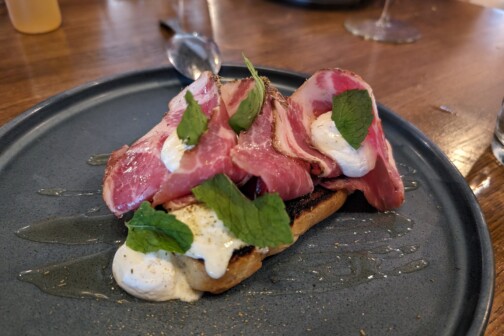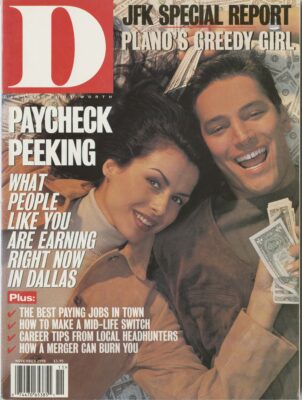MANDY DEALEY’S FATHER WAS MURDERED. THAT’S ALL SHE knows for sure.
On Feb. 28, 1998, her 22-year-old son Christopher found the family patriarch lying in a bloody bed. dead from a gunshot wound to the neck. Shockingly–and sadly-no one in the old man’s hometown of Sunnyvale was particularly surprised.
Mandy Dealey’s last visit to her childhood home at the ranch in Sunnyvale-on the Saturday before her father’s murder-was brief. She had driven up to Dallas from her home in Austin because she was worried about her dad. “He had let the house run down,” Mandy says. “He was living in just four or five rooms.” At 81. Charles Mayhew could no longer manage the huge ranch house by himself.
Mandy noticed that her father was showing the strain of caring for his two even-more-elderly sisters. He’d never been the type to get sick, but over the winter an attack of the flu had hit him hard. Now Mandy worried that her dad wasn’t eating well, and she knew that the old man’s ongoing legal battle with the town of Sunnyvale had worn him out. Mandy had been concerned about her father’s health for some time-she wanted him closer to her. for his sake and for hers. The second family ranch, a 1500-acre spread near San Saba, seemed the perfect solution. Mayhew liked to fish there, (often with his neighbor, actor Tommy Lee Jones), so Mandy hired a contractor to remodel a small house on the property as a retreat for Mayhew. It was almost finished when she came for that last visit to Sunnyvale.
Final memories are often excruciatingly clear. Mandy remembers all the details of her last conversation with her father. She described her upcoming trip to Mexico. Mayhew gathered together books and special mementos of Mandy’s deceased mother for her to take back to Austin. Her father promised that she would see him in San Saba soon.
But only a few days before his ranch retreat was ready, Charles Mayhew was murdered.
No one has been charged with Mayhew’s murder, but police suspect its roots are tangled with the Sunnyvale zoning case that tore the town and the wealthy Mayhew family apart. The legal battle over development turned Mandy’s father-once the quintessential Texas gentleman-into the town pariah and ended with Mandy’s only brother. Chuck, being investigated for their father’s murder. It’s a Texas-size tale of greed, of family secrets that festered for a lifetime, and of a fight for power. So far, no one knows how it will end.
“THEY WANT TO KEEP IT BRIGADOON,” SNEERS Dallas investor Chip Northrup. In this case, Brigadoon is a small corner of southeast Dallas County where people live on large lots with rolling yards like country pastures, without crime, poverty, or messy ethnic problems. Like Brigadoon, Sunnyvale-population 2,400-is an anachronism, a green gap in the steady sprawl of suburbanization.
Mandy’s parents built the Sunnyvale house in 1952, when Mandy was 2 years old and her mother had just given birth to Chuck. As Mandy remembers it, growing up in Sunnyvale was idyllic but lonely.
Two other wealthy Dallas families-the T.C. Luptons and the Eugene Smiths-also bought ranches in the area. But they rarely got involved in Sunnyvale civic affairs, focusing their attention on the big city. Mayhew, on the other hand, threw himself into small-town politics. In 1953, he led the move to incorporate so Sunnyvale would be protected from annexation by Mesquite or Garland. Mayhew served on the school board; schoolchildren chose the town’s cheery name in a contest. And in the late ’60s, Mayhew even served a term as the town’s mayor, presiding over the passage of the most rigid zoning ordinances in the state. Still, the Mayhews never quite became locals. Mayhew drove into Dallas every day so Mandy could attend Hockaday and Chuck could go to St. Mark’s.
Besides the daily car ride, Mandy and Chuck had nothing in common. “I wasn’t athletic,” Mandy says. “Even back then I was a shopper and a clotheshorse like my mother.” Her brother Chuck, whippet-thin, preferred the outdoors, hunting and fishing.
But both enjoyed the total devotion of their father. Mayhew was a ’90s dad before his time. He never missed a “’Dad’s Day” at Hockaday. “We always won the three-legged race,” Mandy recalls. And Mayhew nurtured Chuck’s talent for skeet shooting. A top trainer worked with Chuck, and father and son traveled to competitions all over the state. In high school and college. Chuck became a junior world champion shooter. “He could bust 199 out of 200,” says Northrup, a longtime family friend. Chuck still has six championship guns-each worth $15.000-on display in a fancy trophy case at his father’s house.
On the surface, the Mayhews seemed to have it all-money, talent, power, and prestige. But happy appearances hid secret sorrows. Few people knew that Mandy and Chuck had an older sister. Melissa, bom with a neurological disorder called toxoplasmosis. (The Mayhews paid another family to care for the girl in their home in East Texas.) And fewer still knew that Mandy’s mother Audrey was a serious alcoholic.
But to all who knew her. Mandy was a fairy princess-lithe and pretty and sparkling. After graduating from Hockaday and UT, Mandy made her debut not only in Dallas, but in London, Geneva, and Copenhagen as well, She became engaged to Joe Dealey Jr., a member of the prominent family that publishes the Morning News. Society columns documented their engagement, lavish wedding, and fairy-tale reception at the Dallas Country Club. Everything seemed perfect for the newly-weds. Then on Dec. 19,1972, just six weeks after her wedding, two hoodlum brothers kidnapped 22-year-old Mandy and demanded a $250,000 ransom. Blindfolded and terrified, she endured three long days at the brothers’ mercy, locked in an empty East Dallas apartment.
“I was naive enough, all I kept thinking was ’My daddy’s going to save me,’” Mandy says. “My father had always made things right.” And he did. Mayhew, with help from Dealey’s father, paid the ransom. Dealey’s father helped in another way, too: Not a word of Mandy’s ordeal leaked, until a banner headline in the News one morning announced, “Dallas Socialite Freed Unharmed.”
The sensational crime, the brothers’ arrests, and their trial dominated Dallas headlines for weeks and took its emotional toll on Mandy for years. She went through therapy, and her marriage to Dealey dissolved in 1978. (Mandy is now married to Lawrence Speck, dean of architecture at UT and an occasional contributor to D Magazine; she still uses the Dealey name.) In therapy, Mandy began to realize she’d been shaped by her mother’s alcoholism, only acknowledged by the family when Audrey sought treatment in her early 60s.
“She didn’t get stumbling drunk-ever,” Mandy says. “It was the elephant in the living room you don’t talk about, and there were a number of elephants.”
Like the oldest daughter who was never mentioned and the mother whose constant drinking was ignored. Chuck Mayhew was another elephant in the living room.
NORTHRUP DESCRIBES CHUCK MAYHEW AS “quirky, cocky, funny, great with kids.” But he is also seen as “pushy, obnoxious, in-your-face.” at least to some officials at Sunnyvale’s town hall.
Chuck, who refused to comment for this story, attended SMU and Trinity College, where he shot skeet with the Lackland Air Force team. But his college years were marked by binge drinking and drug use; he was arrested at least once for DWI before he was 21. Friends say that Chuck was the model for the coke-sniffing, booze-swilling character “Sonny Vale” in Out of Control, “Hollywood” Henderson’s memoir of the 1970s Dallas Cowboys. His father-and his father’s money-always bailed him out of trouble. Mandy just stayed away.
Chuck’s common-law marriage ended in divorce. He and his second wife were married and divorced twice. He never held a real job. But in the mid-’80s, Chuck finally had an idea that motivated him, and he made a business proposal to his father. Dallas was growing fast in every direction. The Mayhews had lots of raw land. Why not develop it? Mayhew embraced the idea wholeheartedly, seeing the land as a $20 million-plus legacy for his children, and the venture as one more chance to gain success for his son.
The Mayhews joined with Chip Northrup and his father, Lynn, to form Sunnyvale Properties. Their mixed-use plan for the Mayhew Ranch called for an equestrian community, with up to six single-family homes per acre-a total of 5,200 houses. Mandy’s childhood home would become the site of a country club.
But first the Mayhews had to sell the plan to Sunnyvale, persuading locals to change the town zoning requirement that each house be built on a full acre of land. The town erupted in opposition. Friends and longtime allies were aghast at the size of the project. Even fellow patricians Mary Ann and Gene Smith of the E-Bar-S thought it was too much.
In January 1986, on a visit to her sick mother, Mandy attended a town meeting with her father and was shocked at the heated words that were exchanged about her dad’s project. Mandy heard the message, even sympathized with it; she understood the town’s desire to protect its little corner of paradise. But, hard as she tried, she could not get her father to listen to the complaints against his plan. “Daddy took it all personally,” says Mandy. “It hurt him very much.”
The city rejected the Mayhews’ zoning request, so they reduced the proposal to 3,600 homes. The town rejected that proposal, too.
In 1987 the Mayhews filed a lawsuit against Sunnyvale, accusing it of “illegal takings” by limiting their use of the land. After an acrimonious court battle, the judge finally ruled for the Mayhews in 1992. Sunnyvale appealed but did modify its zoning, allowing higher density for homes. But the Mayhews refused to scale back their plan or to end the lawsuit.
As the case dragged on, the relationship between father and son deteriorated. Chuck started drinking and stopped coming to the office, blaming his father for the legal standoff.
“Chuck was very short-tempered and disrespectful with him, yelling at him,” says Northrup. “Charles took it, always turning the other cheek, a little too passive.” More than once. Chuck angrily resigned from the company, but Mayhew patched things up as he always had, coaxing his son back into business. For years, the father had bailed Chuck out of trouble, rarely holding him accountable. But Chuck wanted something from his father that Mayhew couldn’t give: recognition of his accomplishments. “He wanted so much to succeed,” says a source close to the family. “But he always screwed up.” How could Mayhew recognize Chuck’s successes when there were none? The development’s failure meant the father had failed to make his son successful.
In the mid-’90s, Chuck blew up at his father one last time, resigning from the development company again. Mayhew, finally fed up, wrote his son a letter accepting his resignation.
But Chuck still fully expected to make millions when the partners finally won the lawsuit-not only the money from the land but millions in damages. Though the elder Mayhew now wanted to find a way out of the lawsuit, Chuck advocated pushing it to the bitter end. Chuck wanted to win the fight, to rub the town’s nose in its defeat. It wasn’t just about the money anymore.
Chuck threatened to have his father declared incompetent and committed to Terrell State Hospital; some thought that the son belonged there instead. In March 1997, sheriff’s deputies arrested Chuck after he shot and killed a former girlfriend’s two dogs. After Chuck pleaded nolo contendere, the judge sentenced him to 90 days in jail and a year’s probation, and ordered him to undergo a psychiatric evaluation.
Mayhew felt Chuck’s conduct got even worse after his June 1997 marriage to Phyllis Lynn Dean, who was herself a serious drinker. Mayhew disliked Phyllis intensely, feeling that she was a gold digger who latched onto Chuck after he bragged about how many millions he was going to make “any day now.” In November, Mayhew changed his will, decreasing Chuck’s portion from half to 40 percent and excluding Phyllis entirely.
By late 1997, Mayhew was broke; he had spent $2 million in legal fees, then had borrowed more to keep the lawsuit alive. Chuck wasn’t working. Each month, Mayhew gave his son a portion of his Social Security check. Each week, Mayhew called the clerk of the Texas Supreme Court, which was expected to rule soon. Everything Mayhew had-his pride, his fortune, his town legacy, his relationship with his son-was riding on Mayhew v. Sunnyvale.
For the most part, Mandy kept away from the family conflict. But in January 1998, Chuck ended up in Parkland Hospital after a blackout. Mandy went to see him in the hospital. Mandy refuses to discuss her brother, but a source close to the family says it was the first time she had been with him in two years.
Apparently, Mandy confronted Chuck and told him he was going to drink himself to death. She insisted that he enter an alcohol treatment center. When he resisted, Mandy explored having him committed involuntarily and asked for a psychiatric exam. But before a second psychiatrist could talk to him as required by law, Mayhew had checked Chuck out of the hospital and driven him home. Nevertheless, Chuck blamed his father, not Mandy, for the move to commit him, Furious, Chuck saw it as the ultimate betrayal.
By early 1998, Mayhew had only one real friend left in town: Gene Brown, a former rodeo rider who handled Mayhew’s cattle. On February 28, Brown arrived at the ranch house just before noon to take his boss for their usual Saturday hamburger. Mayhew refused to set foot in the town ’a East Fork Cafe, where, because of the lawsuit, he was not likely to be welcomed anyway, so Brown drove him into Forney for lunch. As they ate, the cowboy noticed that the old man was agitated, his body literally trembling. Brown listened to him complain about the town, the court case, and his son Chuck.
Brown says that Mayhew felt threatened by Chuck and was afraid of his son. Like Mandy, Brown urged Mayhew to move to San Saba to get away from the mess in Sunnyvale.
After lunch that day, Brown dropped his boss off at the disintegrating house. Spider webs covered the porch. Doors sagged on their hinges. So few of the light fixtures worked that Mayhew had to use a flashlight to walk between rooms at night. As he waved goodbye, Brown pictured Mayhew settling into his far back bedroom, impossible to find in the dark, rambling house unless you knew where you were going.
Mayhew called Brown at 5 p.m. to say he was in for the night; the next morning, when Brown called, Mayhew didn’t answer. Brown was concerned but thought the old man might be outside. Hours later, Christopher Dealey, who happened to be in town for a weekend visit, found his grandfather’s body. Mandy had just returned from a trip to Mexico when Christopher called with the news that her father had been murdered.
Notified by sheriff’s deputies, Brown arrived at the ranch house to find Chuck and Phyllis-beers in their hands-standing outside in the freezing weather, surrounded by squad cars with blazing cherry tops. In its investigation of the murder, the Dallas County Sheriff’s Office found no evidence of forced entry or theft.
Chuck is the prime suspect in Mayhew’s murder, according to the authorities. He has not been charged-and may never be. One source says Phyllis told investigators that the couple had been at the Mayhew ranch on Saturday afternoon. Father and son had a huge fight, and Chuck left in a fury. Later, after a drunken quarrel with Phyllis, Chuck returned to his father’s house, So far, Chuck has declined to be interviewed by investigators. He was drunk at his father’s memorial service.
TWO WEEKS AFTER MAYHEW’S DEATH, THE Texas Supreme Court ruled in favor of Sunnyvale. The town has declared a moratorium on development.
Mayhew’s estate owes hefty debts. The land may now be sold to a developer with deeper pockets willing to abide by Sunnyvale’s restrictions. As the majority heiress, Mandy must face that possibility and scores of other decisions.
Whatever she decides to do, she must deal at some point with her brother Chuck.
Chuck is the only elephant left in the living room. And his name is in the will.
Get our weekly recap
Brings new meaning to the phrase Sunday Funday. No spam, ever.
Related Articles

Local News
Mayor Eric Johnson’s Revisionist History
In February, several of the Mayor's colleagues cited the fractured relationship between Broadnax and Johnson as a reason for asking the city Manager to resign. The mayor says those relationship troubles were "overblown" by the media.

Media
Will Evans Is Now Legit
The founder of Deep Vellum gets his flowers in the New York Times. But can I quibble?
By Tim Rogers

Restaurant Reviews
You Need to Try the Sunday Brunch at Petra and the Beast
Expect savory buns, super-tender fried chicken, slabs of smoked pork, and light cocktails at the acclaimed restaurant’s new Sunday brunch service.


